The Role of Government as a Deviant Power: A Sociological Analysis of Cultural Genocide in Canada
VerifiedAdded on 2023/05/28
|5
|1063
|426
AI Summary
This essay discusses the cultural genocide of aboriginal people in Canada and the role of the government as a deviant power. The Marxist approach to the situation is also analyzed.
Contribute Materials
Your contribution can guide someone’s learning journey. Share your
documents today.
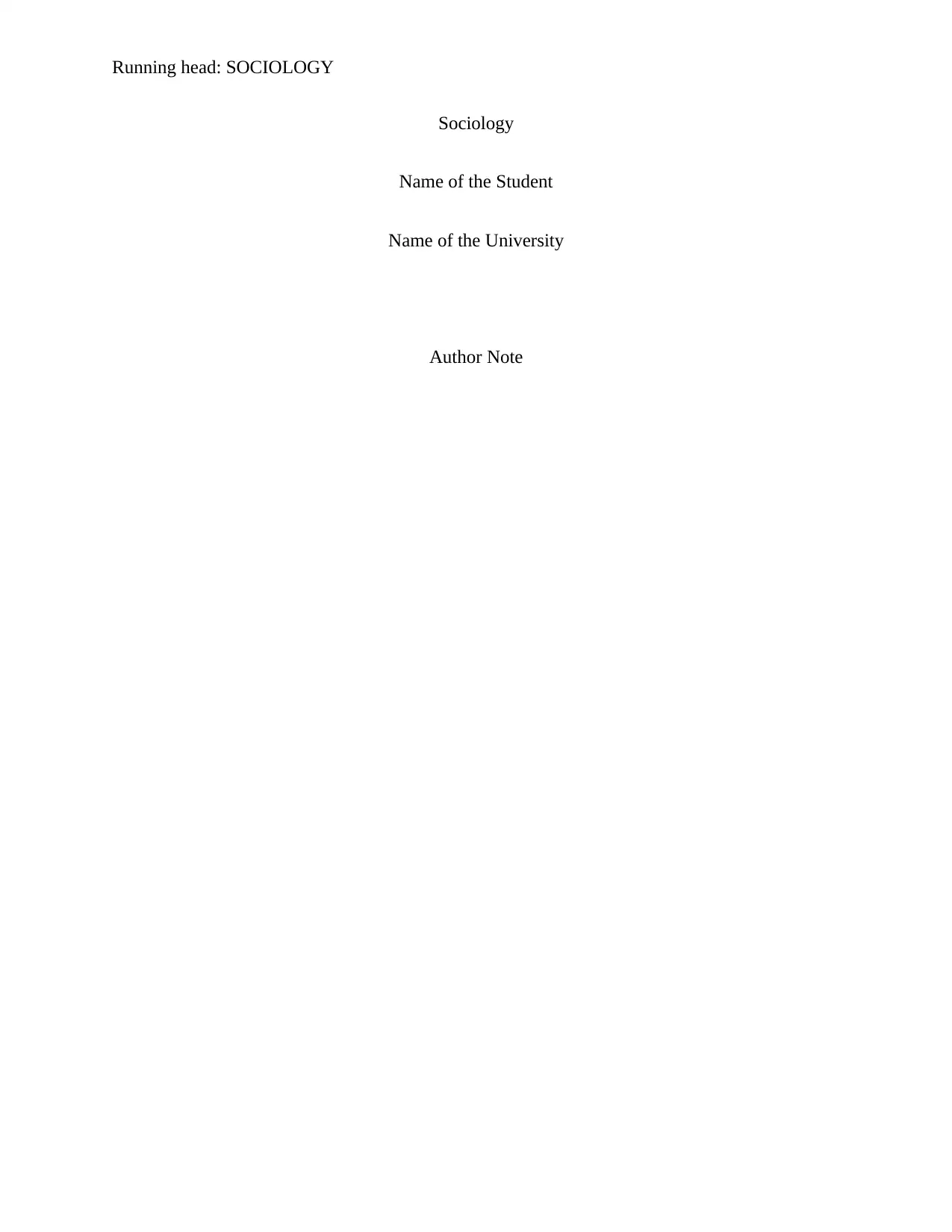
Running head: SOCIOLOGY
Sociology
Name of the Student
Name of the University
Author Note
Sociology
Name of the Student
Name of the University
Author Note
Secure Best Marks with AI Grader
Need help grading? Try our AI Grader for instant feedback on your assignments.
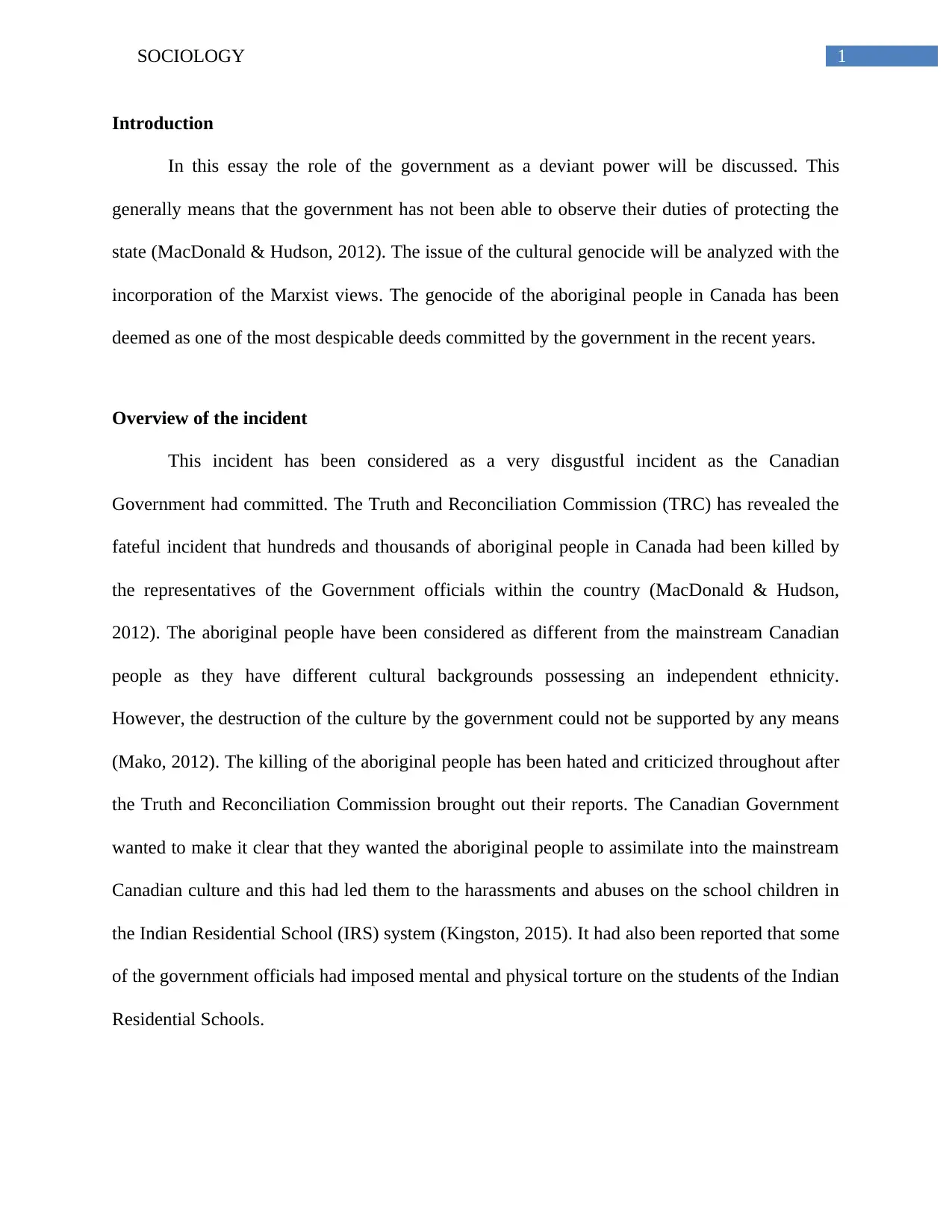
1SOCIOLOGY
Introduction
In this essay the role of the government as a deviant power will be discussed. This
generally means that the government has not been able to observe their duties of protecting the
state (MacDonald & Hudson, 2012). The issue of the cultural genocide will be analyzed with the
incorporation of the Marxist views. The genocide of the aboriginal people in Canada has been
deemed as one of the most despicable deeds committed by the government in the recent years.
Overview of the incident
This incident has been considered as a very disgustful incident as the Canadian
Government had committed. The Truth and Reconciliation Commission (TRC) has revealed the
fateful incident that hundreds and thousands of aboriginal people in Canada had been killed by
the representatives of the Government officials within the country (MacDonald & Hudson,
2012). The aboriginal people have been considered as different from the mainstream Canadian
people as they have different cultural backgrounds possessing an independent ethnicity.
However, the destruction of the culture by the government could not be supported by any means
(Mako, 2012). The killing of the aboriginal people has been hated and criticized throughout after
the Truth and Reconciliation Commission brought out their reports. The Canadian Government
wanted to make it clear that they wanted the aboriginal people to assimilate into the mainstream
Canadian culture and this had led them to the harassments and abuses on the school children in
the Indian Residential School (IRS) system (Kingston, 2015). It had also been reported that some
of the government officials had imposed mental and physical torture on the students of the Indian
Residential Schools.
Introduction
In this essay the role of the government as a deviant power will be discussed. This
generally means that the government has not been able to observe their duties of protecting the
state (MacDonald & Hudson, 2012). The issue of the cultural genocide will be analyzed with the
incorporation of the Marxist views. The genocide of the aboriginal people in Canada has been
deemed as one of the most despicable deeds committed by the government in the recent years.
Overview of the incident
This incident has been considered as a very disgustful incident as the Canadian
Government had committed. The Truth and Reconciliation Commission (TRC) has revealed the
fateful incident that hundreds and thousands of aboriginal people in Canada had been killed by
the representatives of the Government officials within the country (MacDonald & Hudson,
2012). The aboriginal people have been considered as different from the mainstream Canadian
people as they have different cultural backgrounds possessing an independent ethnicity.
However, the destruction of the culture by the government could not be supported by any means
(Mako, 2012). The killing of the aboriginal people has been hated and criticized throughout after
the Truth and Reconciliation Commission brought out their reports. The Canadian Government
wanted to make it clear that they wanted the aboriginal people to assimilate into the mainstream
Canadian culture and this had led them to the harassments and abuses on the school children in
the Indian Residential School (IRS) system (Kingston, 2015). It had also been reported that some
of the government officials had imposed mental and physical torture on the students of the Indian
Residential Schools.
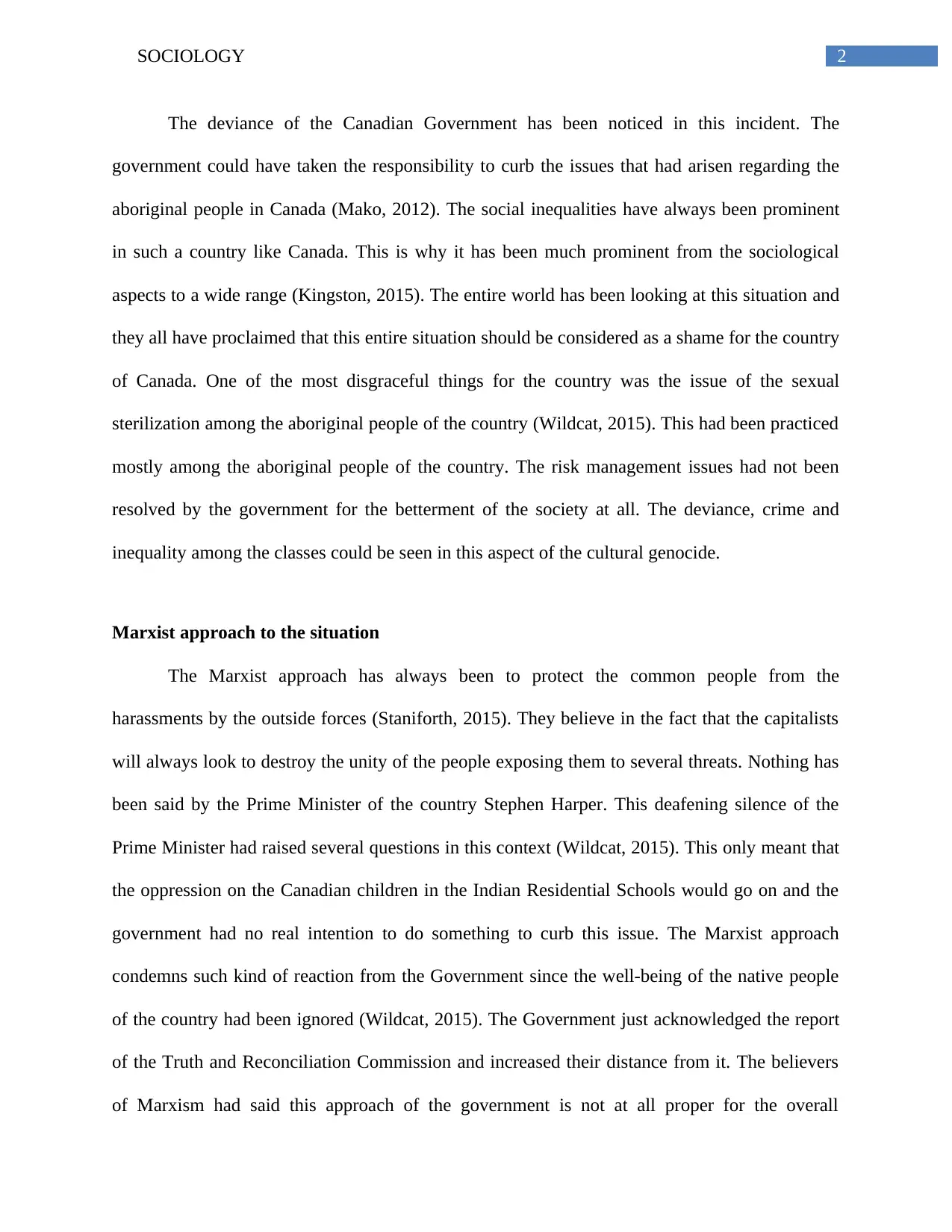
2SOCIOLOGY
The deviance of the Canadian Government has been noticed in this incident. The
government could have taken the responsibility to curb the issues that had arisen regarding the
aboriginal people in Canada (Mako, 2012). The social inequalities have always been prominent
in such a country like Canada. This is why it has been much prominent from the sociological
aspects to a wide range (Kingston, 2015). The entire world has been looking at this situation and
they all have proclaimed that this entire situation should be considered as a shame for the country
of Canada. One of the most disgraceful things for the country was the issue of the sexual
sterilization among the aboriginal people of the country (Wildcat, 2015). This had been practiced
mostly among the aboriginal people of the country. The risk management issues had not been
resolved by the government for the betterment of the society at all. The deviance, crime and
inequality among the classes could be seen in this aspect of the cultural genocide.
Marxist approach to the situation
The Marxist approach has always been to protect the common people from the
harassments by the outside forces (Staniforth, 2015). They believe in the fact that the capitalists
will always look to destroy the unity of the people exposing them to several threats. Nothing has
been said by the Prime Minister of the country Stephen Harper. This deafening silence of the
Prime Minister had raised several questions in this context (Wildcat, 2015). This only meant that
the oppression on the Canadian children in the Indian Residential Schools would go on and the
government had no real intention to do something to curb this issue. The Marxist approach
condemns such kind of reaction from the Government since the well-being of the native people
of the country had been ignored (Wildcat, 2015). The Government just acknowledged the report
of the Truth and Reconciliation Commission and increased their distance from it. The believers
of Marxism had said this approach of the government is not at all proper for the overall
The deviance of the Canadian Government has been noticed in this incident. The
government could have taken the responsibility to curb the issues that had arisen regarding the
aboriginal people in Canada (Mako, 2012). The social inequalities have always been prominent
in such a country like Canada. This is why it has been much prominent from the sociological
aspects to a wide range (Kingston, 2015). The entire world has been looking at this situation and
they all have proclaimed that this entire situation should be considered as a shame for the country
of Canada. One of the most disgraceful things for the country was the issue of the sexual
sterilization among the aboriginal people of the country (Wildcat, 2015). This had been practiced
mostly among the aboriginal people of the country. The risk management issues had not been
resolved by the government for the betterment of the society at all. The deviance, crime and
inequality among the classes could be seen in this aspect of the cultural genocide.
Marxist approach to the situation
The Marxist approach has always been to protect the common people from the
harassments by the outside forces (Staniforth, 2015). They believe in the fact that the capitalists
will always look to destroy the unity of the people exposing them to several threats. Nothing has
been said by the Prime Minister of the country Stephen Harper. This deafening silence of the
Prime Minister had raised several questions in this context (Wildcat, 2015). This only meant that
the oppression on the Canadian children in the Indian Residential Schools would go on and the
government had no real intention to do something to curb this issue. The Marxist approach
condemns such kind of reaction from the Government since the well-being of the native people
of the country had been ignored (Wildcat, 2015). The Government just acknowledged the report
of the Truth and Reconciliation Commission and increased their distance from it. The believers
of Marxism had said this approach of the government is not at all proper for the overall
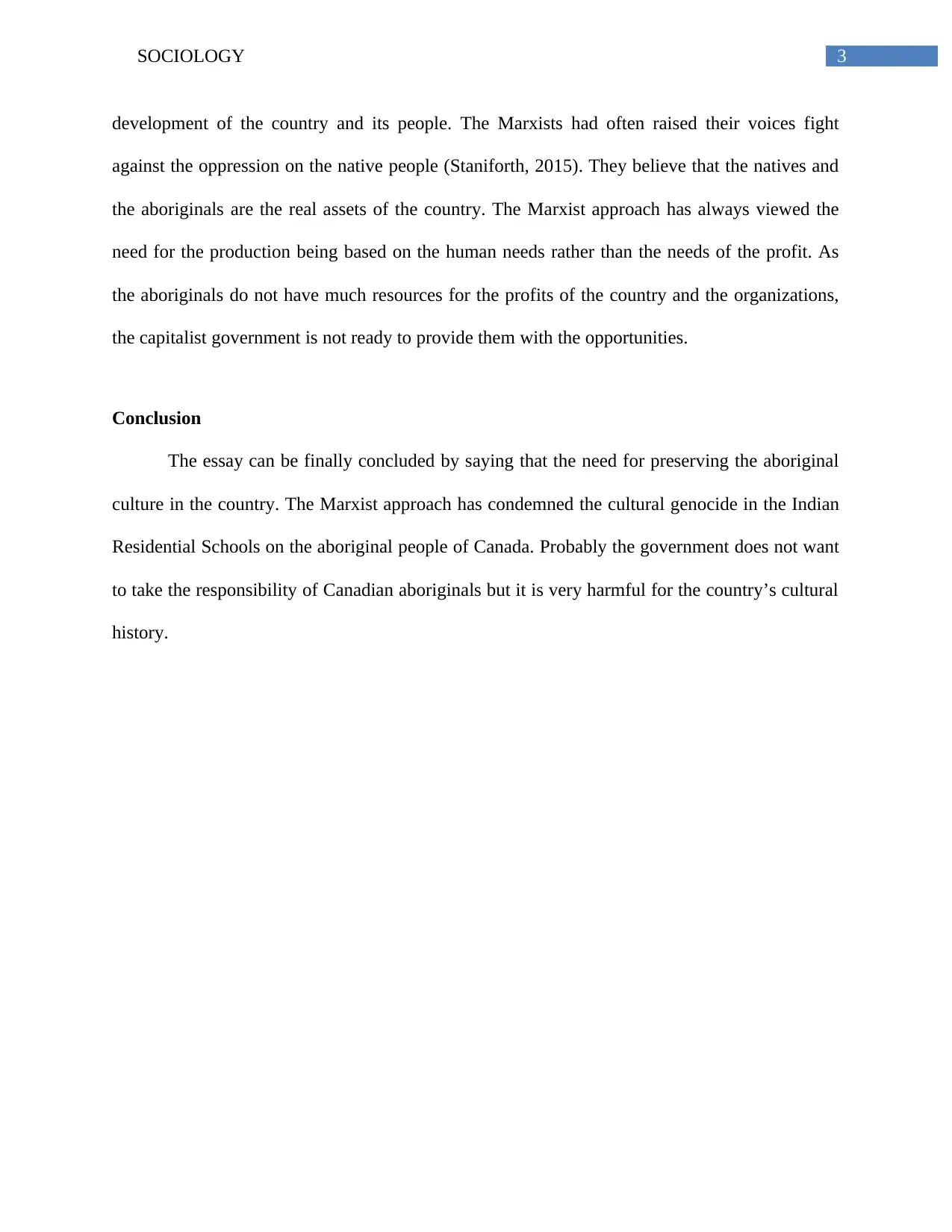
3SOCIOLOGY
development of the country and its people. The Marxists had often raised their voices fight
against the oppression on the native people (Staniforth, 2015). They believe that the natives and
the aboriginals are the real assets of the country. The Marxist approach has always viewed the
need for the production being based on the human needs rather than the needs of the profit. As
the aboriginals do not have much resources for the profits of the country and the organizations,
the capitalist government is not ready to provide them with the opportunities.
Conclusion
The essay can be finally concluded by saying that the need for preserving the aboriginal
culture in the country. The Marxist approach has condemned the cultural genocide in the Indian
Residential Schools on the aboriginal people of Canada. Probably the government does not want
to take the responsibility of Canadian aboriginals but it is very harmful for the country’s cultural
history.
development of the country and its people. The Marxists had often raised their voices fight
against the oppression on the native people (Staniforth, 2015). They believe that the natives and
the aboriginals are the real assets of the country. The Marxist approach has always viewed the
need for the production being based on the human needs rather than the needs of the profit. As
the aboriginals do not have much resources for the profits of the country and the organizations,
the capitalist government is not ready to provide them with the opportunities.
Conclusion
The essay can be finally concluded by saying that the need for preserving the aboriginal
culture in the country. The Marxist approach has condemned the cultural genocide in the Indian
Residential Schools on the aboriginal people of Canada. Probably the government does not want
to take the responsibility of Canadian aboriginals but it is very harmful for the country’s cultural
history.
Secure Best Marks with AI Grader
Need help grading? Try our AI Grader for instant feedback on your assignments.
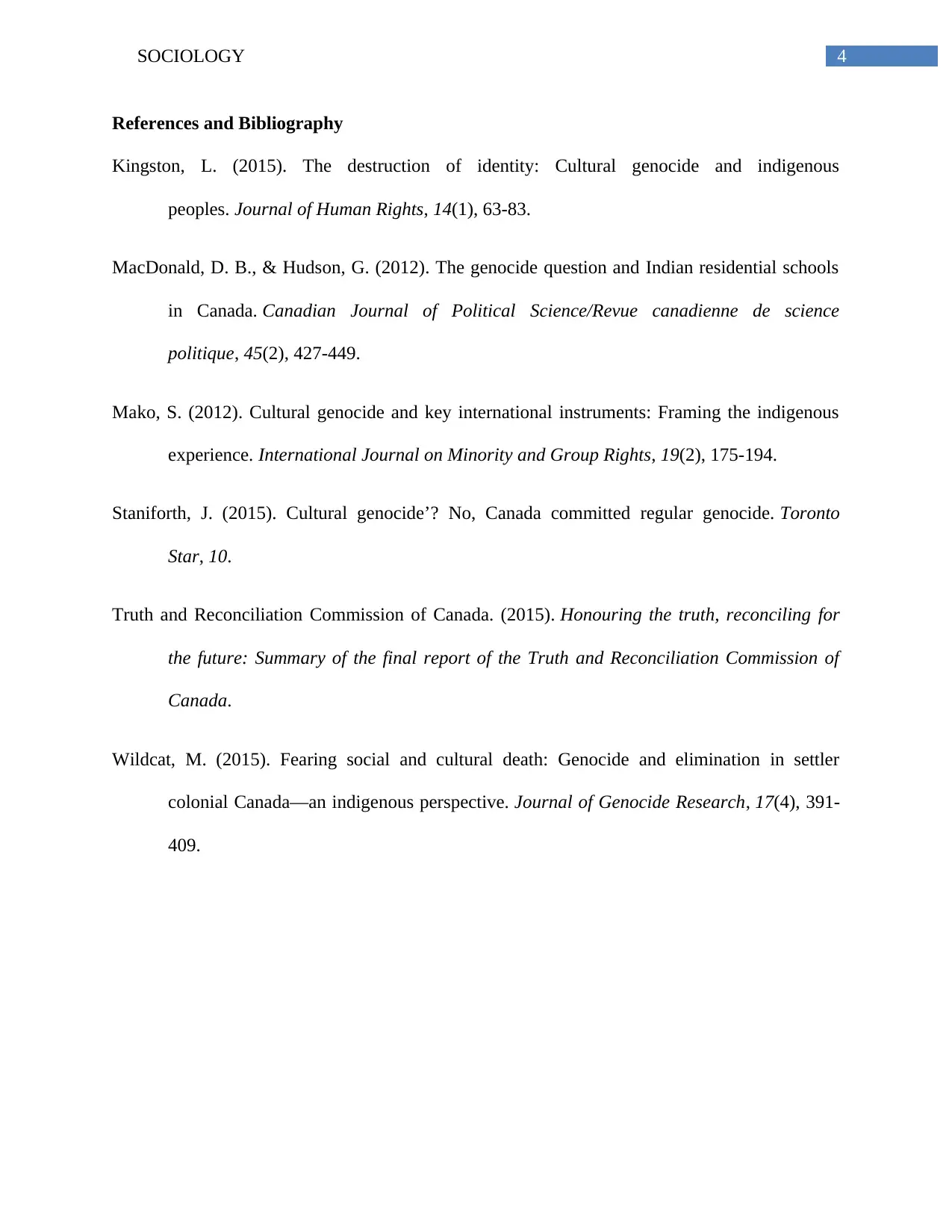
4SOCIOLOGY
References and Bibliography
Kingston, L. (2015). The destruction of identity: Cultural genocide and indigenous
peoples. Journal of Human Rights, 14(1), 63-83.
MacDonald, D. B., & Hudson, G. (2012). The genocide question and Indian residential schools
in Canada. Canadian Journal of Political Science/Revue canadienne de science
politique, 45(2), 427-449.
Mako, S. (2012). Cultural genocide and key international instruments: Framing the indigenous
experience. International Journal on Minority and Group Rights, 19(2), 175-194.
Staniforth, J. (2015). Cultural genocide’? No, Canada committed regular genocide. Toronto
Star, 10.
Truth and Reconciliation Commission of Canada. (2015). Honouring the truth, reconciling for
the future: Summary of the final report of the Truth and Reconciliation Commission of
Canada.
Wildcat, M. (2015). Fearing social and cultural death: Genocide and elimination in settler
colonial Canada—an indigenous perspective. Journal of Genocide Research, 17(4), 391-
409.
References and Bibliography
Kingston, L. (2015). The destruction of identity: Cultural genocide and indigenous
peoples. Journal of Human Rights, 14(1), 63-83.
MacDonald, D. B., & Hudson, G. (2012). The genocide question and Indian residential schools
in Canada. Canadian Journal of Political Science/Revue canadienne de science
politique, 45(2), 427-449.
Mako, S. (2012). Cultural genocide and key international instruments: Framing the indigenous
experience. International Journal on Minority and Group Rights, 19(2), 175-194.
Staniforth, J. (2015). Cultural genocide’? No, Canada committed regular genocide. Toronto
Star, 10.
Truth and Reconciliation Commission of Canada. (2015). Honouring the truth, reconciling for
the future: Summary of the final report of the Truth and Reconciliation Commission of
Canada.
Wildcat, M. (2015). Fearing social and cultural death: Genocide and elimination in settler
colonial Canada—an indigenous perspective. Journal of Genocide Research, 17(4), 391-
409.
1 out of 5
![[object Object]](/_next/static/media/star-bottom.7253800d.svg)





